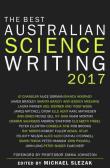'The annual collection celebrating the finest voices in Australian science writing.
'From the furthest reaches of the universe to the microscopic world of our genes, science offers writers the kind of scope other subjects simply can't match. Good writing about science can be moving, funny, exhilarating, or poetic, but it will always be honest and rigorous about the research that underlies it. Now in its seventh year, The Best Australian Science Writing brings together knowledge and insight from Australia’s brightest thinkers as they explore the intricacies of the world around us. This lively collection of essays covers a wide range of subjects, and challenges our perceptions of the world and how we exist within it.' (Publication summary)




